Saudi Arabia vs Iran
Crucial moment to decide whether moderate Arab countries led by Saudi Arabia can lead the Islamic world
Ikuzo Kobayashi, President of NPO Salaam Association
From the Spring Issue of the electronic Salaam Quarterly Bulletin, No.17, February 2016
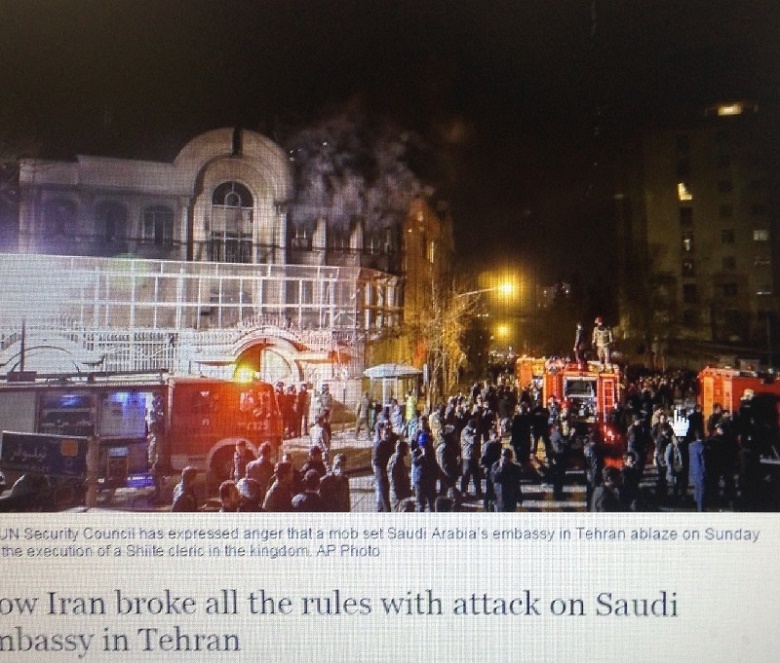
UAE online news National reports about Iranian mob assaulted on Saudi embassy in Tehran
The Saudi embassy in Tehran was attacked and stormed by Iranian mob with frangible grenades on January 2. In the wake of this attack on the Saudi embassy in Iran, Saudi Arabia criticized Iranian government for “its failure to prevent mob violence against the embassy protected under the international laws” and severed diplomatic relations with Iran. Bahrain and Sudan followed Saudi Arabia. Kuwait and UAE recalled ambassadors from Iran. The United States, Russia and the United Nations appealed for self-restraint to prevent further escalation of tensions between two countries.
The confrontation between Saudi Arabia and Iran is widely regarded as a proxy war between Sunni and Shia that are waging sectarian war within Islam. However, the development of the Middle Eastern situation has been unpredictable in recent years with the Arab Spring movement, emergence of the Islamic State (IS), spread of terrorism and refugee.
Based on the background which led to the severance of diplomatic relations with Iran by Saudi Arabia, moderate Arab countries centered on Saudi Arabia are in a critical stage to determine whether they can lead the Islamic world.
Attack on the Saudi embassy in Iran, its beginning and course of events
The Interior Ministry of Saudi Arabia announced that it had carried out death penalty against 47 individuals involved in the terrorist attack. Many of those executed were members of Al Qaeda but Sheikh Nimr al-Nimr, Shiite cleric in Saudi Arabia, was included in them. Sheikh al-Nimr was convicted with death penalty, being accused of leading a protest movement against Saudi government from 2011 to 2012. Shia Islam is the national religion of Iran and Iran regarded him as high-ranking Shiite cleric. Iran’s Supreme Leader Ayatollah Ali Khamenei (Ayatollah Khomeini’s successor and the supreme leader of judicial, legislative and executive branches and military of Iran) stated that “Allah does not forgive” execution of Sheikh al Nimr and condemned Saudi Arabia, saying, “Divine vengeance will surely fall upon Saudi politicians.”
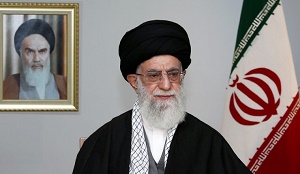
Sayyed Ali Hosseini Khamenei, Supreme Leader of Iran
The Saudi reaction was quick. Saudi Foreign Minister Adel al-Jubeir announced severance of diplomatic relations with Iran on January 3. The Saudi aviation authority decided to terminate operation of all direct air flights between Iran and Saudi Arabia on January 4. (Although the pilgrimage to Mecca is allowed, termination of direct air flights will cause inconvenience in travel.)
The United States and the UN appealed for self-restraint to prevent further escalation of tensions between Saudi Arabia and Iran, and Russia and Turkey announced that they are prepared to mediate them.
Against the background of volatile bilateral showdown, the Iranian government said their embassy in Sanaa, Yemen had been hit by a Saudi airstrike on January 7. Iranian Foreign Ministry spokesman condemned “deliberate Saudi attacks” and said Iran will “present an Iranian government report on the airstrike on the embassy to the United Nations and ask the UN Security Council to issue a protest against Saudi Arabia.” (Excerpts from Asahi Shimbun digital version on January 8, 2016)
The state-run Saudi news agency publicized the statement of the headquarters of the Islamic coalition force which denied Saudi airstrike on the Iranian embassy on January 8. The statement said, “The Islamic coalition force led by Saudi Arabia did not conduct military actions in the area where the embassy is located.”
Internal conflicts in Yemen started from the Arab Spring
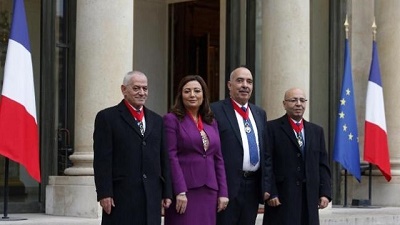
2015/10/10 – The Norwegian Nobel Committee has decided that the Nobel Peace Prize for 2015 is to be awarded to the Tunisian National Dialogue Quartet for its decisive contribution to the building of a pluralistic democracy in Tunisia.(Wikipedia)
Since the Iraq war in 2003, the United States and Europeans countries increased pressure on Arab Islamic countries to democratize their system. In response to the increased pressure, public awareness increased that ‘Western-style democratization does not fit Arab Islamic societies’ and ‘democratization should be led by Arabs and Muslims rather than Western countries.’ Such awareness spread quickly among young people through IT devises they use. The Arab Spring which started in Tunisia evolved into a political movement to ‘defeat corrupt dictatorship regimes which collaborated with the Western countries and selfishly amassed wealth.’ With prevalence of smart phones, political slogans against corrupt dictatorships quickly spread throughout Arab Islamic countries through social networks. Thus, anti-government movement has developed in individual countries.
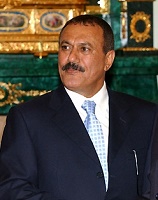
Ali Abdullah Saleh, 1st President of Yemen
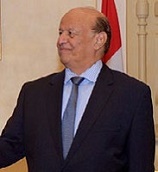
Abd Rabbuh Mansur Hadi,President of Yemen
The Arab Spring successfully defeated long-term dictatorships in Tunisia, Egypt and Libya. Yemen was no exception and the movement caused then-President Ali Abdullah Saleh who had ruled the country for 30 years to step down. However, because President Saleh was a Shiite, Yemen went through a difference course of events than other three countries. Yemen’s course was different from Syria whose president was a Shiite or Iraq which was ruled by a Shiite prime minister.
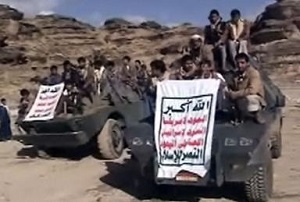
A convoy of Houthi fighters (August 2009)
Houthi victory in North Yemen; Conflict escalates into a full-scale civil war with a Saudi-led foreign intervention.
In February, 2012, the power of Yemen was transferred from then-President Saleh to Interim Presindent Abd Rabbuh Mansur Hadi (who was Vice President under then-President Saleh). However, the Houthis, a Shia group, claimed that Saudi Arabia was involved in the power transition and started an armed rebellion. The Shia militant group enhanced offensives from summer, 2014 and President Hadi increased suspicion and caution that Iran was supplying arms to the Houthi rebels. The Houthis eventually seized the presidential palace in January, 2015, and forced President Hadi to go into exile in Aden.
After the Houthi coup, the Iranian government dispatched an aircraft to Yemen ostensibly to expand food and medical aid on March 3 and agreed with the Houthis to start regular air flights connecting two countries. Iran had denied criticism that it supplied arms and funds to the Houthis in the past, but started supporting the Houthis overtly after consolidation of power by the group. In the middle of March, 2015, Taiz Airport in Yemen (located between the capital Sanaa and Aden) was seized by the Shia group, causing deterioration of security and forcing the United States special force stationed in the country to withdraw.
Gulf coalition force militarily intervenes in Yemen
In response to the request from Yemeni President Hadi, the Saudi government mobilized the coalition force of five Persian Gulf countries (Saudi Arabia, UAE, Kuwait, Qatar and Bahrain) to “support the legitimate government recognized by the international society and prevent Yemen from falling under the Houthi control” and conducted airstrikes against strongholds of the Houthis on March 26, 2015.
In Yemen, Al Qaeda in Arabian Peninsula, extremist group, is still strong, and terrorist attacks in Sanaa on March 20 claimed lives of more than 140 people for which the Islamic State (IS) claimed responsibility.
There is a widely-held perception that the internal conflicts in Yemen are a proxy war between Sunni and Shia represented by Saudi Arabia and Iran respectively. If the crisis in Yemen evolves into a full-scale civil war, it is obvious that IS will take advantage of the Yemeni civil war to mobilize its foreign fighters and expand its sphere of influence there. Therefore, the reason why the Gulf countries led by Saudi Arabia started air strikes was to end the internal conflicts in Yemen and to prevent further expansion of IS and Al Qaeda.
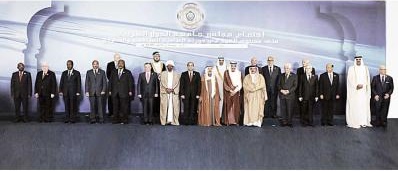
Group photo of the Arab League summit in March, 2015
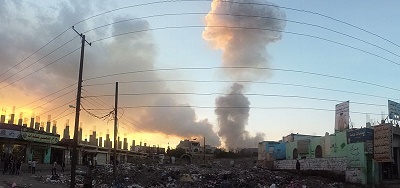
Air strikes in Sanaa, the capital of Yemen by Saudi-led Parisian Gulf coalition forces on May 11, 2015
The Arab League summit was held on March 28 and 29, 2015 and the summit reached an agreement to establish a joint Arab task force. During the summit, Saudi Arabia tried to persuade heads of participating Arab countries to gain their understanding about military intervention in Yemen and obtained support from the majority. On March 27, President Obama had a telephone discussions with Saudi Arabia’s King Salman and conveyed his support for the Saudi intervention in Yemen. While Saudi Arabia held strong concern about the Western countries’ nuclear negotiations with Iran, Saudi Arabia-led air strikes against strongholds of the Houthis in Yemen was supported by the United States.
From agreement to establish a joint Arab task force to the formation of the Islamic Military Alliance
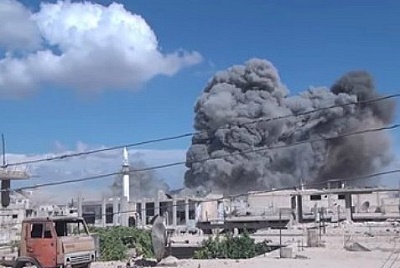
Black smoke spreads in Homs, Syria in the aftermath of Russian air strikes on September 30
(Television video)
Although it was agreed to establish a joint Arab task force, consideration of specific contents of the force took time and Russia started air strikes in Syria on September 30. Egypt and Saudi Arabia which led the formation of the task force reportedly had different views on Russia which is supporting Syria’s Assad regime. While Egypt accepted Russian intervention in Syria in the hope that Russia’s actions contribute to elimination of the Muslim Brotherhood, affiliated radical jihadists and IS, Saudi Arabia did not accept Russian intervention in Syria. It became necessary to coordinate their opinions.
On December 15, 2015, Saudi Arabia announced formation of an anti-terrorist Islamic Military Alliance composed of 34 member countries and areas in the Middle East, Africa and Asia. The military alliance is led by Saudi Arabia and its operation headquarters will be located in Saudi capital Riyadh. Saudi Arabia envisions the military alliance’s coordination with the United States and European countries. The Saudi deputy crown prince and defense minister, Mohammed bin Salman stated that the alliance plan “came about from the zeal to fight terrorism which attacks the Islamic world and the international community.” (Jiji Press from Cairo)
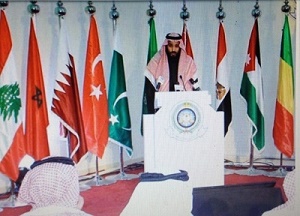
Saudi Arabia announced the formation of a 34-state Islamic military coalition to combat terrorism, according to a joint statement published on state news agency SPA.
A handout picture provided by the Saudi Press Agency (SPA) on December 15, 2015, shows Saudi Defence Minister and Deputy Crown Prince Mohammed bin Salman holding a press conference on December 14, 2015. (screen shot)
It is not correct to group together the Arab Spring movement and the extremist group IS. The Arab Spring is manifestation of desire of the public in Arab Islamic countries for Islamic democracies. On the other hand, IS seeks for a Sharia-based Islamic state which considers radical Islamist (jihadist) laws and battles all forces which do not accept them in the name of jihad. IS indiscriminately targets infidels, Shiites and all others for terrorism.
It is an urgent need for the Persian Gulf countries to eliminate the IS threat. It is higher priority than coping with the Lebanese Hizbollah, Shia extremist group, Iraqi Shia leader Muqtada al-Sadr, or the Houthis in Yemen. Al Qaeda and IS which are inciting conflicts between Sunni and Shia in Yemen. It is clear that the formation of the Islamic Military Alliance was motivated by the desire to prevent Al Qaeda and IS from taking advantage of sectarian conflicts between Sunni and Shia in Yemen for their terrorist strategies and prevent Syria-like civil war in Yemen. The Gulf countries led by Saudi Arabia defined Islamic extremist groups as a common enemy of the Islamic society and the international community and launched their war on terrorism through the formation of the Islamic Military Alliance.
Moderate stance of Saudi Arabia as a nation
1) In 1973 during the Fourth Middle East War, Japan encountered the oil crisis. Six Persian Gulf countries unilaterally raised the crude oil price by 70% in order to support Egypt and Syria, members of the Organization of Petroleum Exporting Countries (OPEC), in their war against Israel. They also announced oil embargo against countries friendly to Israel. At that time, Iran and Libya took a hardline stance and Saudi Arabia took a moderate stance.

Line at a gas station in Maryland, United States, June 15, 1979. (US Library of Congress)
In 1979 during the Islamic Revolution in Iran, Japan encountered the second oil crisis. The United States and the United Kingdom lost their oil interests in Iran overnight. The crude oil production in Iran was terminated completely from December 28, 1978 to March 6, 1979, causing the global recession. Saudi Arabia argued that “crude oil prices should be left to market forces.”
Judging from these two events, it became apparent that Saudi Arabia chose to leave its economy to market forces which dominate the global economy rather than imposing Islamic economic principles on the international economy. The international community remembers the Saudi argument at that time as a moderate stance.
2) In August, 1990, Iraqi President Saddam Hussein (now deceased) mobilized Iraqi forces and invaded Kuwait. On the same day, the United Nations Security Council unanimously adopted a resolution to condemn the Iraqi invasion and demand immediate withdrawal of Iraqi forces (UN Security Council Resolution 660). The UN Security Council promised to give full support to all efforts, especially the efforts of the Arab League to bring about withdrawal of Iraqi forces.
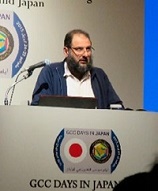
Dr. Al-Katan, Director-General of Religious Affairs Bureau, Ministry of Justice of Bahrain
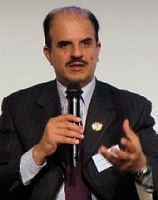
Dr. Abudulaziz bin Saleh bin Salamah, Deputy Minister of Foreign Information of Saudi Arabia
However, the Arab League encountered Iraqi refusal and the League’s efforts to find solution to the crisis hit a stalemate. This is because even if a joint Arab task force can be formed there was little possibility that such task force can defeat Iraqi forces. The religious conference of Sunni grand muftis criticized Iraqi invasion of Kuwait as violation of the teachings of the Koran, and regarded infidels rather than the West as a real enemy of Islam. Based on such stance, they stated, “Arabs and non-Arabs, Muslims and non-Muslims alike have made efforts to stop the invasion of the oppressor Saddam Hussein. Since the oppressor refused to go along, a war is justified,” and supported the use of force under the banner of the United Nations.
Multinational forces were formed and ① thirteen Islamic countries participated with other countries. Among them, Arab Islamic countries are eight countries including six Gulf countries, Egypt and Syria. Although Usama bin Ladin and his associates had wide-spread influence in Saudi Arabia, King Fahd made a decision to accept multinational forces. Saudi Arabia respected the common values of the UN member countries expressed in the UN Charter, and joined with the international community to participate in the war to protect the international law and order.
3) During the ② GCC Days in Japan conference held in Tokyo in April last year, Dr. Al-Katan, Director-General of Religious Affairs Bureau, Ministry of Justice of Bahrain stated, “Religious sects, ideologies and thoughts are regarded as equal. The Koran teaches that killing one person is equivalent to killing the entire mankind. We should respect and express courtesy to each other. The UNESCO Charter indicates that the respect for humanity beyond races and nationalities is the starting point.” (Salaam Quarterly Bulletin No. 14, page 4)
He further pointed out that a resolution to eliminate terrorism was adopted in Mecca, Saudi Arabia in February, 2015, and Sabah Al Ahmad Al Jaber Al Sabah, the Emir of Kuwait, was commended as a “leader of humanitarian services” by the United Nation for his promotion of humanitarianism in September, 2014. He then emphasized that the GCC has been actively making efforts to stand against IS.
During discussions, Dr. Abudulaziz bin Saleh bin Salamah, Deputy Minister of Foreign Information of Saudi Arabia candidly stated, “The victims of IS are us. We are inconvenienced. Our society is united against IS and 40 countries are fighting against them. That is reality.”
In conclusion
In the wake of the attack on the Saudi embassy in Iran at the beginning of this year, many observers think that Saudi Arabia has taken more aggressive posture. It was reported that the confrontation between Saudi Arabia and Iran has become more apparent. Because of such preconception, air strikes against the Iranian embassy in Yemen by Saudi Arabia announced by the Iranian government was interpreted as a Saudi retaliation against Iran for the embassy attack. Also Saudi Arabia’s termination of diplomatic relations with Iran was perceived and reported as a Saudi overreaction against Iran in self-restraint.
Is such preconception based on lessons learned from historical facts? As explained above, it is not based on those facts. The Persian Gulf countries centered on Saudi Arabia are countries geographically closest to IS territories, and their next target after Iraq, Syria and Yemen. Due to the offensive by the Coalition of the willing, IS shifted its focus to Libya. This is because the offensive against oil facilities in Syria under control of IS has intensified, choking off the funding source of IS. IS had to target oil facilities in Libya to secure a new funding source.
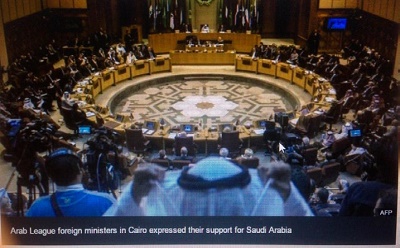
Arab League ministers back Saudi Arabia and condemn Iran in Cairo on January 10, 2016, calling on Arab states to take a clear position against Iran’s alleged meddling in Arab affairs.
The Jiji Press reported on the emergency Arab League foreign ministers meeting to discuss about the attack on the Saudi embassy in Iran as follows on January 10, 2016:
“They announced a joint statement to condemn Iran’s hostile acts and provocation which was endorsed by all member countries except Lebanon which hosts Shia militant groups. Saudi foreign minister Adel al-Jubeir stated that if Iran continues interfering in the affairs of Arab countries the entire Arab community will become Iran’s enemy.”
Saudi Arabia is neither too aggressive nor overreacting to Iran. It is Iran which is interfering in the political affairs of Arab countries. If the confrontation between Sunni and Shia intensifies as the result, that will only benefit extremist groups.
Arab Islamic countries led by Saudi Arabia are taking actions merely to preserve the international law and order. The series of events prior to and after the attack on the Saudi embassy can be characterized as Iran’s interference in the affairs of Arab countries.
The success in launching of the Islamic Military Alliance depends on whether moderate Arab countries led by Saudi Arabia can lead the Islamic world. Saudi Arabia is at the critical moment in this sense.
I sincerely pray for the successful efforts by Saudi-led Gulf countries.
Footnotes:
① thirteen Islamic countries
List of countries which participated in the multinational forces (from Wikipedia)
Thirteen Islamic countries which participated in the multinational forces are underlined.
North and South Americas: United States, Canada, Argentine, Honduras
Europe: United Kingdom, France, Spain, Portugal, Italy, Greece, Denmark, Norway, Belgium, the Netherlands, Germany, Poland, Czechoslovakia, Hungary
Asia: South Korea, Bangladesh, Pakistan, Afghanistan, Bahrain, Qatar, United Arab Emirates, Oman, Kuwait, Saudi Arabia, Syria, Turkey
Oceania: Australia, New Zealand
Africa: Egypt, Morocco, Niger, Senegal, Gambia
② GCC Days in Japan
Reprinted from Salaam Quarterly Bulletin No. 14, May, 2015
GCC DAYS IN JAPAN held in Tokyo April 22-24, 2015
The Cooperation Council for the Arab States of the Gulf (GCC) has held the GCC Days conference annually since the first such conference in Paris in 2004. The conferences have been held mainly in Europe for the past 10 years, but the 10th conference was held in Tokyo, Japan. Representing the sponsor, Mr. Kharid Al-Ghassani of the GCC greeted the participants, saying, “The GCC member countries (six Gulf countries) are united and aim at building a good relationship with the host country through the conference.”
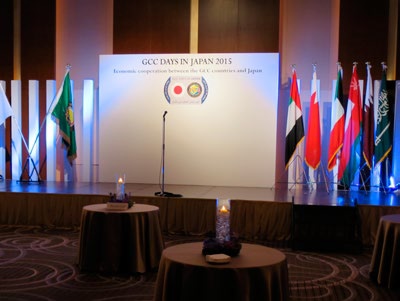
Reception held at Conrad Tokyo Hotel on April 22, 2015
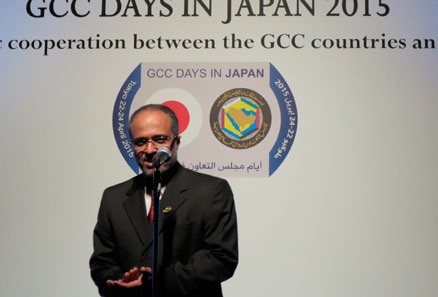
Host address by His Excellency Mr. Kharid Al-Ghassani, GCC Assistant Secretary-General for Culture & Information Affairs
More articles available in the electronic “Salaam Quarterly Bulletin”, No.17, February 2016.
